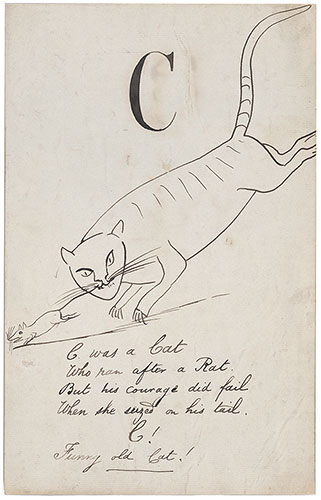
From the mid-1840s onwards, the poet and painter Edward Lear made illustrated nonsense alphabets (also called “picture alphabets”) like this one as gifts for children of his acquaintance. Unfortunately, we do not know the name of the child or children for whom this alphabet was created. Though the Morgan’s alphabet is not dated, the paper Lear used has a watermark of 1859, a period of his life when he was shuttling constantly back and forth between England and Italy. Lear imagined a long afterlife for his alphabets, telling his friend Samuel Sandbach in 1846 that the pages could be pasted onto linen to make them sturdier (The Complete Verse and Other Nonsense, ed. Noakes, p. 488). The alphabet at the Morgan was glued onto wood-pulp boards at some point prior to its acquisition by the library in 1977, and it remains in this format today.
The form remained largely the same across Lear’s nonsense alphabets: from top to bottom, a single letter, drawn to imitate a printed letter, then a drawing of an animal, object, or person whose name or designation began with that letter, then a short poem, written in cursive, which ended with a re-statement of the letter. The alphabets were meant to educate and delight, simultaneously. Lear experimented with matching many different words to letters in the alphabets, but, as the biographer Jenny Uglow has noted, “X” was always “King Xerxes” (Uglow, Mr. Lear: A Life of Art and Nonsense, p. 263). The Morgan’s alphabet has particularly beautiful examples of Lear’s ability to draw birds in “E was an Eagle” and “Q was a Quail,” reflecting his early career as an ornithological draughtsman.
An aspect of the alphabet that may be hard to appreciate in the digital facsimile is its size: the boards are tall and narrow, 12.5 x 8 inches, about the size of a cereal box. We know that Lear would sometimes present his alphabets to their intended recipients in a dramatic fashion. One of these children, Daisy Terry, who was staying with her parents and her brother Arthur at the same pension as Lear near Turin in the summer of 1870, later recalled:
“Every day Arthur and I found a letter of it on our plate at luncheon, and finally a title-page for the collection, with a dedication and a portrait of himself, with his smile and his spectacles, as the ‘Adopty Duncle.’” (Lodge, Inventing Edward Lear, p. 248)
The Morgan pages would have been a large and impressive gift to receive, day after day, on one’s lunch plate.
The Morgan’s alphabet has not been published, though other Lear alphabets appear in the collections Nonsense Songs, Stories, Botany, and Alphabets (Robert John Bush, 1871) and The Complete Verse and Other Nonsense (Penguin, 2001). Some of the alphabets have also been published in standalone editions, such as A Nonsense Alphabet (Doubleday, 1952).
Introduction by Sal Robinson, Assistant Curator of Literary and Historical Manuscripts, 2020.












